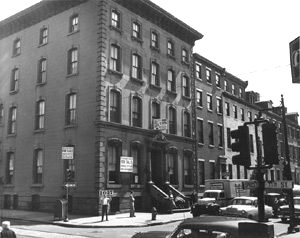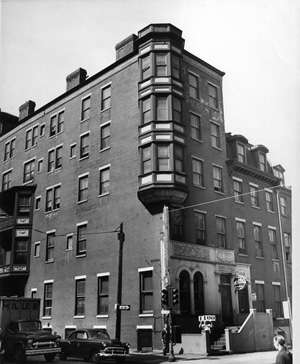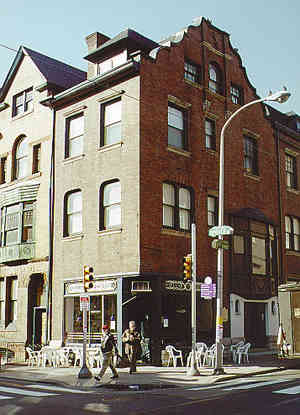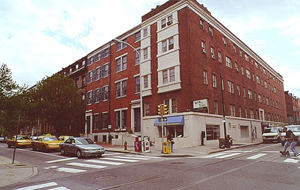
The urban renewal plan drafted for Washington Square West during the 1960s proposed a comprehensive property-by-property improvement comparable to that which had begun in Society Hill in the previous decade. However, by the time the plan was ready for implementation in the early 1970s, federal funding for neighborhood reinvestment had declined significantly, and a more limited improvement approach had to be pursued.
Four buildings at the intersection of 11th and Spruce Streets illustrate the results of this approach. Two of the four corner properties were restored for new uses as a result of action by the Redevelopment Authority of the City of Philadelphia (RDA), based on the area's urban renewal plan; the other two corner properties at this intersection, like many others in the area, were not targeted for Redevelopment Authority action.
In 1963, the RDA acquired 1035-37 Spruce Street (northeast corner of the intersection)—home from 1879-1881 to Republican state senator and political boss Matthew S. Quay. A real-estate company had been on the verge of demolishing this four-story brownstone mansion with its ornate ballroom. (The earliest portion was built in the Italianate style prior to 1840 for druggist Edward Roberts.) The authority planned to convey it to nearby Thomas Jefferson University. The medical school's initial proposal was for use as a student residence and activity center, but that concept devolved into destruction for a parking lot. The RDA instead approved a proposal submitted by the privately owned Performing Arts School. The school restored the Quay House in keeping with standards for historical properties (established by the City as part of the urban renewal plan) and moved into the building. Not long after, a serious fire caused extensive damage, forcing the school to move out and relinquish ownership. In the 1980s, a private Philadelphia developer, Historic Landmarks for Living, acquired the Quay House and converted it to 20 flats and bi-level apartments. The building is listed in the National Register of Historic Places.
Diagonally opposite, on the southwest corner of 11th and Spruce Streets (1100-1102 Spruce), stands a mid-19th-century building that was once the Hotel Colonial, advertised as "Conveniently located for all visitors to Philadelphia...Every room with bath or running water." A corner turret (now gone) and the ornate 11th-Street entrance (shifted from Spruce Street) were added about 1900, when the hotel was converted to apartments. By the 1960s, the Colonial, damaged by fire and neglect, had been downgraded to rooming-house status. During the 1970s, in keeping with "deinstitutionalization" policies of the time, the property became a single-room-occupancy residence for chronically ill people released from mental hospitals. The RDA acquired the Colonial, and maintained the property during the 1970s, eventually relocating all the residents. The vacant building was advertised for development proposals in 1983 and converted into 24 apartments. The private developer upgraded the exterior of the structure, using standards set by the Philadelphia Historical Commission, which had recently implemented policies more stringent than those of preceding decades (see Tour Stop 2, Society Hill).
Although detailed rehabilitation specifications were drawn up for buildings on the other two corners (northwest and southeast) of the 11th-and-Spruce intersection (as well as for many other Washington Square West properties), reductions in federal funding made it impossible for the RDA to acquire buildings such as these, or to compel the owners to rehabilitate them based on government-mandated specifications. Because of these circumstances, Washington Square West today does not have the uniform, finished look of adjacent Society Hill, where every address in the neighborhood was redeveloped or upgraded as part of the area plan. On the other hand, Washington Square West has a more varied, diverse character than Society Hill, which has a more limited range of property uses and architectural styles. For example, a Society Hill type of renewal plan would have called for removing the ground-floor commercial establishments from the northwest and southeast corners of 11th and Spruce streets. These restaurants are regarded by many community members today as neighborhood assets, not as problems which should have been removed through public intervention.
Another example is the treatment of the streetscape. When the RDA conveyed properties in Washington Square West to developers, it required them to install brick sidewalks—a demand that was not made of purchasers of individual homes. Unlike Society Hill (see Tour Stop 2), federal funding was not available to pave entire blocks in brick; thus the sidewalks in Washington Square West are mostly stretches of concrete paving, interspersed with stretches of brick.
William J. Way, manager of the RDA in the 1970s, played the central role in organizing and coordinating the development of Washington Square West. (The William J. Way Community Center at 1315 Spruce Street is named in his memory.) He used innovative strategies for collaboration between the government and the community and took a creative approach to implementing neighborhood reinvestment plans in an environment of limited resources. In subsequent decades, his outlook and methods had a strong, reverberating influence on John Kromer, Director of Housing for the Philadelphia Office of Housing and Community Development, as well as other practitioners of neighborhood reinvestment policies.
- In
the book Neighborhood Recovery, John
Kromer contrasts the development of Washington Square West with the
earlier implementation of urban renewal plans for the adjacent Society
Hill area. (Chapter 1, "A Strategic Problem.")
www.neighborhoodrecovery.com
- For
information about Washington Square West, contact:
Office Manager
Washington Square West Civic Association
1209 Locust Street
Philadelphia, PA 19107
215/545-3260 - For
information on the Philadelphia Historical Commission, contact:
Director
Philadelphia Historical Commission
576 City Hall
Philadelphia, PA 19107
215/686-7660 voice
215/686-7674 fax
www.phila.gov/historical
![]()

Northeast corner of
11th and Spruce Streets, 1958.

Southwest corner of
11th and Spruce Streets, 1958.

Northwest corner of
11th & Spruce Streets, 2001.

Southeast corner of
11th and Spruce Streets, 2001